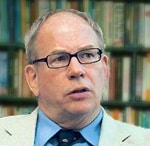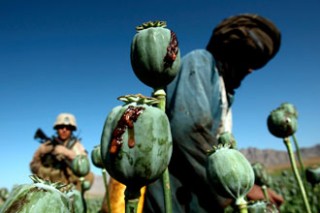By F. William Engdahl
– The evidence suggests however that far from an honest leak, it is a calculated disinformation to the gain of the US and perhaps Israeli and Indian intelligence and a coverup of the US and Western role in drug trafficking out of Afghanistan. –
Since the dramatic release of a US military film of a US airborne shooting of unarmed journalists in Iraq, Wiki-Leaks has gained global notoreity and credibility as a daring website that releases sensitive material to the public from whistleblowers within various governments. Their latest “coup” involved alleged leak of thousands of pages of supposedly sensitive documents regarding US informers within the Taliban in Afghanistan and their ties to senior people linked to Pakistan’s ISI military intelligence.
The evidence suggests however that far from an honest leak, it is a calculated disinformation to the gain of the US and perhaps Israeli and Indian intelligence and a coverup of the US and Western role in drug trafficking out of Afghanistan.
Since the posting of the Afghan documents some days ago the Obama White House has given the leaks credibility by claiming further leaks pose a threat to US national security. Yet details of the papers reveals little that is sensitive. The one figure most prominently mentioned, General (Retired) Hamid Gul, former head of the Pakistani military intelligence agency, ISI, is the man who during the 1980’s coordinated the CIA-financed Mujahideen guerilla war in Afghanistan against the Soviet regime there. In the latest Wikileaks documents, Gul is accused of regularly meeting Al Qaeda and Taliban leading people and orchestrating suicide attacks on NATO forces in Afghanistan.
The leaked documents also claim that Osama bin Laden, who was reported dead three years ago by the late Pakistan candidate Benazir Bhutto on BBC, was still alive, conveniently keeping the myth alove for the Obama Administration War on Terror at a point when most Americans had forgotten the original reason ssthe Bush Administration allegedly invaded Afghanistan to pursue the Saudi Bin Laden for the 9/11 attacks.
Demonizing Pakistan?
The naming of Gul today as a key liaison to the Afghan “Taliban” forms part of a larger pattern of US and British recent efforts to demonize the current Pakistan regime as a key part of the problems in Afghanistan. Such a demonization greatly boosts the position of recent US military ally, India. Furthermore, Pakistan is the only muslim country possessing atomic weapons. The Israeli Defense Forces and the Israeli Mossad intelligence agency reportedly would very much like to change that. A phoney campaign against the politically outspoken Gul via Wikileaks could be part of that geopolitical effort.
The London Financial Times says Gul’s name appears in about 10 of roughly 180 classified US files that allege Pakistan’s intelligence service supported Afghan militants fighting Nato forces. Gul told the newspaper the US has lost the war in Afghanistan, and that the leak of the documents would help the Obama administration deflect blame by suggesting that Pakistan was responsible. Gul told the paper, “I am a very favourite whipping boy of America. They can’t imagine the Afghans can win wars on their own. It would be an abiding shame that a 74-year-old general living a retired life manipulating the Mujahedeen in Afghanistan results in the defeat of America.”
Notable, in light of the latest Afghan Wikileaks documents, is the spotlight on the 74-year-old Gul. As I wrote in a previous piece, Warum Afghanistan? Teil VI:Washingtons Kriegsstrategie in Zentralasien, published this June on this website, Gul has been outspoken about the role of the US military in smuggling Afghan heroin out of the country via the top-security Manas Air Base in Kyrgyzstan.
As well, in a UPI interview on September 26, 2001, two weeks after the 9-11 attacks, Gul stated, in reply to the question who did Black Sept. 11?, “Mossad and its accomplices. The US spends $40 billion a year on its 11 intelligence agencies. That’s $400 billion in 10 years. Yet the Bush Administration says it was taken by surprise. I don’t believe it. Within 10 minutes of the second twin tower being hit in the World Trade Center CNN said Osama bin Laden had done it. That was a planned piece of disinformation by the real perpetrators” Gul is clearly not well liked in Washington. He claims his request for travel visas to the UK and to the USA have repeatedly been denied. Making Gul into the arch enemy would suit some in Washington nicely.
Who is Julian Assange?
Wikileaks founder and self-described “Editor-in-chief”, Julian Assange, is a mysterious 29-year-old Australian about whom little is known. He has suddenly become a prominent public figure offering to mediate with the White House over the leaks. Following the latest leaks, Assange told Der Spiegel, one of three outlets with which he shared material from the most recent leak, that the documents he had unearthed would “change our perspective on not only the war in Afghanistan, but on all modern wars.” He stated in the same interview that ‘”I enjoy crushing bastards.” Wikileaks, founded in 2006 by Assange, has no fixed home and Assange claims he “lives in airports these days.”
Yet a closer examination of the public position of Assange on one of the most controversial issues of recent decades, the forces behind the September 11, 2001 attacks on the Pentagon and World Trade Center shows him to be curiously establishment. When the Belfast Telegraph interviewed him on July 19, he stated,
“Any time people with power plan in secret, they are conducting a conspiracy. So there are conspiracies everywhere. There are also crazed conspiracy theories. It’s important not to confuse these two….” What about 9/11?: “I’m constantly annoyed that people are distracted by false conspiracies such as 9/11, when all around we provide evidence of real conspiracies, for war or mass financial fraud.” What about the Bilderberg Conference?: “That is vaguely conspiratorial, in a networking sense. We have published their meeting notes.”
That statement from a person who has built a reputation on being anti-establishment is more than notable. First, as thousands of physicists, engineers, military professionals and airline pilots have testified, the idea that 19 barely-trained Arabs armed with box-cutters could divert four US commercial jets and execute the near-impossible strikes on the Twin Towers and Pentagon over a time period of 93 minutes with not one Air Force NORAD military interception, is beyond belief. Precisely who executed the professional attack is a matter for genuine unbiased international inquiry.
Notable for Mr Assange’s blunt denial of any sinister 9/11 conspiracy is the statement in a BBC interview by former US Senator, Bob Graham, who chaired the United States Senate Select Committee on Intelligence when it performed its Joint Inquiry into 9/11. Graham told BBC, “I can just state that within 9/11 there are too many secrets, that is information that has not been made available to the public for which there are specific tangible credible answers and that that withholding of those secrets has eroded public confidence in their government as it relates to their own security.” BBC narrator: “Senator Graham found that the cover-up led to the heart of the administration.” Bob Graham: “I called the White House and talked with Ms. Rice and said, ‘Look, we’ve been told we’re gonna get cooperation in this inquiry, and she said she’d look into it, and nothing happened.'”
Of course, the Bush Administration was able to use the 9/11 attacks to launch its War on Terrorism in Afghanistan and then Iraq, a point Assange conveniently omits.
For his part, General Gul claims that US intelligence orchestrated the Wikileaks on Afghanistan to find a scapegoat, Gul, to blame. Conveniently, as if on cue, British Conservative Prime Minister David Cameron, on a state visit to India, lashed out at the alleged role of Pakistan in supporting Taliban in Afghanistan, conveniently lending further credibility to the Wikileaks story. The real story of Wikileaks has clearly not yet been told.
Endnotes
General Hamid Gul, Arnaud de Borchgrave 2001 Interview with Hamid Gul, Former ISI Chief, UPI, reprinted July 2010 on https://www.veteranstodayarchives.com/2010/07/28/arnaud-de-borchgrave
2001-interview-with-hamid-gul-former-isi-chief/
Julian Assange, Interview in Belfast Telegraph, July 19, 2010.

Frederick William Engdahl (born August 9, 1944) is an American writer, economics researcher, historian, and freelance journalist.
He is the author of the best-selling book on oil and geopolitics, A Century of War: Anglo-American Oil Politics and the New World Order. It has been published as well in French, German, Chinese, Russian, Czech, Korean, Turkish, Croatian, Slovenian, and Arabic. In 2010 he published Gods of Money: Wall Street and the Death of the American Century, completing his trilogy on the power of oil, food, and money control.
Mr. Engdahl is one of the more widely discussed analysts of current political and economic developments, and his provocative articles and analyses have appeared in numerous newspapers and magazines and well-known international websites. In addition to discussing oil geopolitics and energy issues, he has written on issues of agriculture, GATT, WTO, IMF, energy, politics, and economics for more than 30 years, beginning the first oil shock and world grain crisis in the early 1970s. His book, ‘Seeds of Destruction: The Hidden Agenda of Genetic Manipulation has been translated into eight languages. A new book, Full Spectrum Dominance: Totalitarian Democracy in the New World Order describes the American military power projection in terms of geopolitical strategy. He won a ‘Project Censored Award’ for Top Censored Stories for 2007-08.
Mr. Engdahl has lectured in economics at the Rhein-Main University in Germany and is a Visiting Professor in Economics at Beijing University of Chemical Technology.
After a degree in politics from Princeton University (USA), and graduate study in comparative economics at the University of Stockholm, he worked as an independent economist and research journalist in New York and later in Europe, covering subjects including the politics of energy policy in the USA and worldwide; GATT Uruguay Round trade talks, EU food policies, the grain trade monopoly, IMF policy, Third World debt issues, hedge funds, and the Asia crisis.
Engdahl contributes regularly to a number of international publications on economics and political affairs including Asia Times, FinancialSense.com, 321.gold.com, The Real News, Russia Today TV, Asia Inc., GlobalResearch.com, Japan’s Nihon Keizai Shimbun, Foresight magazine. He has been a frequent contributor to the New York Grant’sInvestor.com, European Banker and Business Banker International and Freitag and ZeitFragen in Germany, Globus in Croatia. He has been interviewed on various geopolitical topics on numerous international TV and radio programs including Al Jazeera, CCTV and Sina.com (China), CCTV (China) Korea Broadcasting System (KBS), and RT Russian TV. He is a Research Associate of Michel Chossudovsky’s well-respected Centre for Research on Globalization in Montreal, Canada, and a member of the editorial board of Eurasia magazine.
Mr. Engdahl has been a featured speaker at numerous international conferences on geopolitical, GMO, economic, and energy subjects. Among them is the Ministry of Science and Technology Conference on Alternative Energy, Beijing; London Centre for Energy Policy Studies of Hon. Sheikh Zaki Yamani; Turkish-Eurasian Business Council of Istanbul, Global Investors’ Forum (GIF) Montreaux Switzerland; Bank Negara Indonesia; the Russian Institute of Strategic Studies; the Chinese Ministry of Science and Technology (MOST), Croatian Chamber of Commerce and Economics.
He currently lives in Germany and, in addition to teaching and writing regularly on issues of international political economy and geopolitics, food security, economics, energy, and international affairs, is active as a consulting political risk economist for major European banks and private investors. A sample of his writings is available at Oil Geopolitics.net
ATTENTION READERS
We See The World From All Sides and Want YOU To Be Fully InformedIn fact, intentional disinformation is a disgraceful scourge in media today. So to assuage any possible errant incorrect information posted herein, we strongly encourage you to seek corroboration from other non-VT sources before forming an educated opinion.
About VT - Policies & Disclosures - Comment Policy




